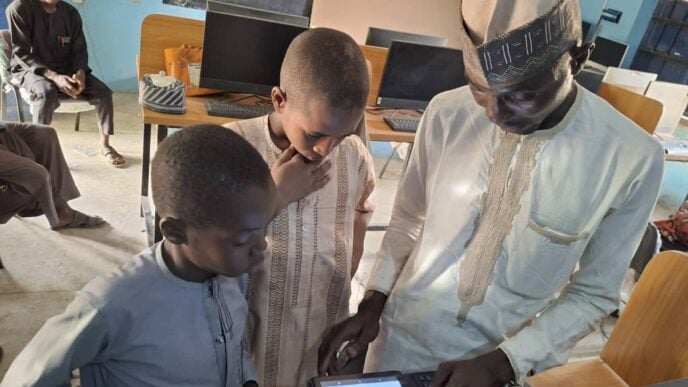By: Adesua Etomi-Wellington · Ini Dima-Okojie · Banky Wellington · Osasu Igbinedion Ogwuche · Seun Okinbaloye · Alhanislam · Hamzat Lawal · Toolz · Aproko Doctor
Nigeria is a global force—home of Afrobeats, Nollywood, a surging tech scene, and the very future of black excellence. We are bold, creative, unstoppable. But one part of our story remains painfully unfinished: the political exclusion of Nigerian women.
Right now, Nigeria ranks near the bottom of the world for women in parliament. Just 18 out of 469 federal lawmakers are women. That’s 3.8%—in a country where women make up nearly half the population. Let that sink in.
This isn’t just a gender issue. It’s a development emergency.
Nigerian women are not on the sidelines of society. They are its engine. They nurture families, heal communities, grow food, build businesses, lead classrooms, and drive our culture and economy forward. Women lead 43% of our small and medium enterprises—the backbone of job creation and innovation. They are our caregivers, peace builders, problem solvers, and often the first responders in times of crisis.
Advertisement
Yet in politics, they are locked out of the rooms where decisions about their lives, families, and futures are made.
Around the world, nations that prioritise inclusive governance are thriving. Rwanda rebuilt from genocide by putting women at the centre of power—today, women hold 61% of seats in its lower house. That’s not symbolic. It’s strategic. Rwanda now leads in economic growth, education, and trust in government.
Scandinavian countries—Norway, Sweden, Finland—show us that when women lead, sustainability, equity, and innovation follow. They don’t just have seats at the table. They’re shaping the future.
Advertisement
So what’s holding Nigeria back? Centuries of cultural bias. Political violence. Systemic exclusion. But these barriers can be broken—and the Reserved Seats for Women Bill is the hammer.
The bill guarantees a minimum number of seats for women in both federal and state legislatures. It’s not about handouts—it’s about balance. Nigerian women aren’t asking for favours. They’re demanding equal footing in a democracy they help sustain every single day.
Here’s what the data tells us: when women lead, communities thrive. Female lawmakers are more likely to champion education, health care, maternal well-being, environmental stewardship, and anti-corruption laws. Countries with more women in leadership are more stable, more prosperous, and more just.
Meanwhile, Nigeria is still flying with one wing.
Advertisement
According to the World Economic Forum’s 2023 Gender Gap Report, Nigeria ranks 125th out of 146 countries in gender parity—behind Ghana, Kenya, South Africa, and even countries like Iraq. That’s not just embarrassing. It’s unacceptable.
We can—and must—do better.
Passing this bill will change everything. It will send a powerful message to every Nigerian girl: You belong in the room where decisions are made. It will bring more voices, more lived experiences, and more wisdom to the table. It will unlock Nigeria’s full potential—not just for growth, but for justice, innovation, and sustainability. We’ve seen what Nigerians can do when we rise as one—through Ebola, COVID, and democratic transitions. We’ve seen the strength of our women in markets, in hospitals, in homes, and in movements. Now is another defining moment.
To the National Assembly: Pass the bill. To the president, governors, and party leaders: Back it. To every Nigerian: demand it.
Advertisement
We can’t afford to sideline half our talent. Nigerian women are already leading—in boardrooms, in classrooms, in our communities. It’s time politics caught up.
Let’s throw the doors open. Let’s build a democracy that looks like Nigeria. Let’s lead the continent not just in culture and innovation—but in justice, equity, and power.
Advertisement
The time is now.
Advertisement
Views expressed by contributors are strictly personal and not of TheCable.









